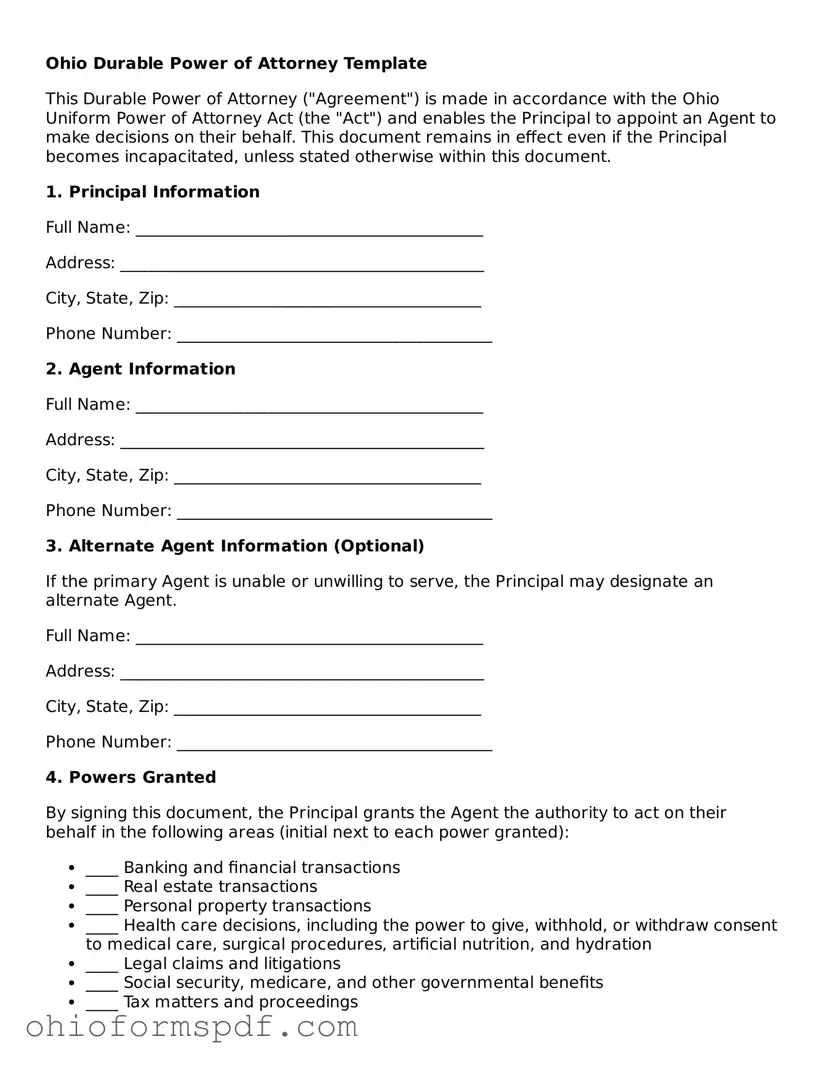Ohio Durable Power of Attorney Template
This Durable Power of Attorney ("Agreement") is made in accordance with the Ohio Uniform Power of Attorney Act (the "Act") and enables the Principal to appoint an Agent to make decisions on their behalf. This document remains in effect even if the Principal becomes incapacitated, unless stated otherwise within this document.
1. Principal Information
Full Name: ___________________________________________
Address: _____________________________________________
City, State, Zip: ______________________________________
Phone Number: _______________________________________
2. Agent Information
Full Name: ___________________________________________
Address: _____________________________________________
City, State, Zip: ______________________________________
Phone Number: _______________________________________
3. Alternate Agent Information (Optional)
If the primary Agent is unable or unwilling to serve, the Principal may designate an alternate Agent.
Full Name: ___________________________________________
Address: _____________________________________________
City, State, Zip: ______________________________________
Phone Number: _______________________________________
4. Powers Granted
By signing this document, the Principal grants the Agent the authority to act on their behalf in the following areas (initial next to each power granted):
- ____ Banking and financial transactions
- ____ Real estate transactions
- ____ Personal property transactions
- ____ Health care decisions, including the power to give, withhold, or withdraw consent to medical care, surgical procedures, artificial nutrition, and hydration
- ____ Legal claims and litigations
- ____ Social security, medicare, and other governmental benefits
- ____ Tax matters and proceedings
5. Special Instructions
The Principal may specify limitations to the Agent's powers, conditions, or expand the Agent's authority here:
__________________________________________________________________________
__________________________________________________________________________
6. Effective Date and Duration
This Power of Attorney is effective immediately upon signing and will remain in effect indefinitely unless a specific termination date is set forth below:
Termination Date (if applicable): ___________________________________________
7. Signatures
This document needs to be signed by the Principal, Agent, and a Notary Public to be valid.
Principal's Signature: ___________________________ Date: _________________
Agent's Signature: _______________________________ Date: _________________
Alternate Agent's Signature (if applicable): _______________________________ Date: _________________
State of Ohio
County of _____________________
Subscribed, sworn to, and acknowledged before me by __________________ (Principal), and __________________ (Agent/Alternate Agent), this ____ day of ______________, 20__.
Notary Public: _____________________________________
My Commission Expires: ____________________________

